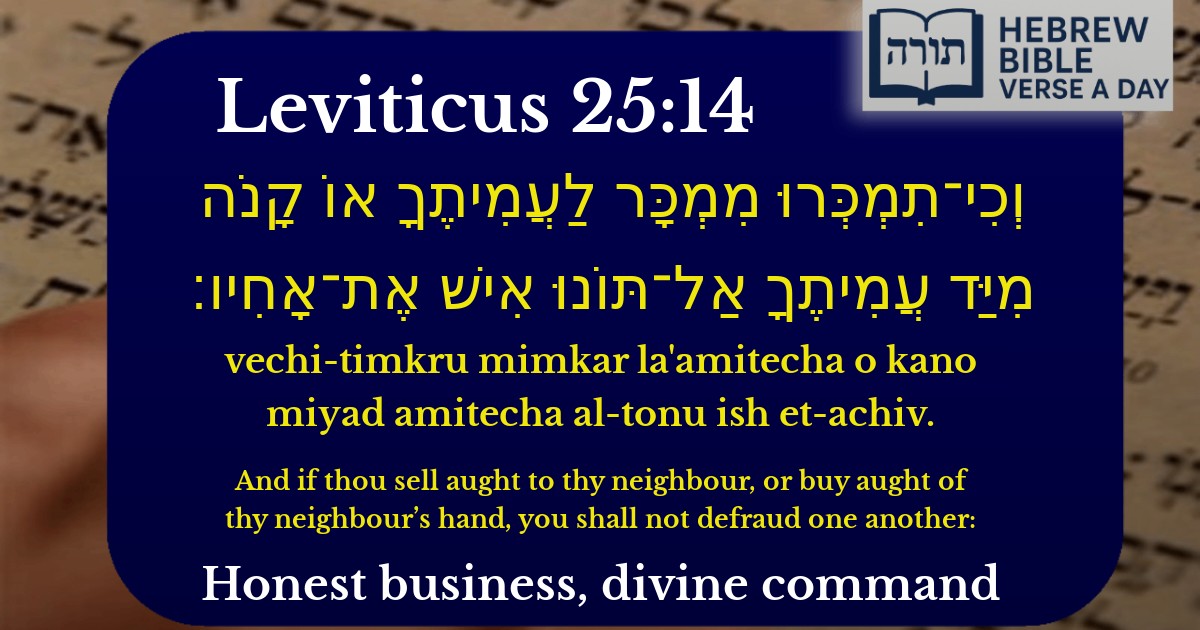Join Our Newsletter To Be Informed When New Videos Are Posted
Join the thousands of fellow Studends who rely on our videos to learn how to read the bible in Hebrew for free!
Hebrew Text
וְכִי־תִמְכְּרוּ מִמְכָּר לַעֲמִיתֶךָ אוֹ קָנֹה מִיַּד עֲמִיתֶךָ אַל־תּוֹנוּ אִישׁ אֶת־אָחִיו׃
English Translation
And if thou sell aught to thy neighbour, or buy aught of thy neighbour’s hand, you shall not defraud one another:
Transliteration
Vechi-timkru mimkar la'amitecha o kano miyad amitecha al-tonu ish et-achiv.
Hebrew Leining Text
וְכִֽי־תִמְכְּר֤וּ מִמְכָּר֙ לַעֲמִיתֶ֔ךָ א֥וֹ קָנֹ֖ה מִיַּ֣ד עֲמִיתֶ֑ךָ אַל־תּוֹנ֖וּ אִ֥ישׁ אֶת־אָחִֽיו׃
וְכִֽי־תִמְכְּר֤וּ מִמְכָּר֙ לַעֲמִיתֶ֔ךָ א֥וֹ קָנֹ֖ה מִיַּ֣ד עֲמִיתֶ֑ךָ אַל־תּוֹנ֖וּ אִ֥ישׁ אֶת־אָחִֽיו׃
🎵 Listen to leining
Parasha Commentary
📚 Talmud Citations
This verse is quoted in the Talmud.
📖 Bava Metzia 49b
The verse is cited in the context of discussing the prohibition of fraud in business transactions, emphasizing the ethical treatment between individuals in commerce.
📖 Sifra Behar, Parashah 4
The verse is referenced in the discussion of laws regarding fair trade and the prohibition of deceitful practices between neighbors or fellow community members.


Prohibition Against Fraud in Business
The verse (Vayikra 25:14) establishes a fundamental ethical principle in Jewish commerce: the prohibition of ona'ah (fraudulent dealings) in business transactions. Rashi explains that this applies both to overcharging and underpaying, as the Torah states, "you shall not defraud one another"—indicating mutual responsibility.
Scope of the Prohibition
Rambam (Hilchot Mechira 12:1) elaborates that ona'ah applies to both buyer and seller, and extends beyond monetary fraud to include verbal deception (ona'at devarim). The Talmud (Bava Metzia 58b) emphasizes that misleading someone in business violates this mitzvah, even if no money changes hands.
Threshold for Fraud
The Mishnah (Bava Metzia 4:3) establishes that a discrepancy of more than one-sixth of an item's true value constitutes ona'ah:
Spiritual Dimension
The Sforno notes that this prohibition appears in the context of the Sabbatical and Jubilee laws to teach that proper business conduct is integral to maintaining holiness in the Land of Israel. The Midrash (Torat Kohanim) connects this mitzvah to the broader principle of "Love your neighbor as yourself" (Vayikra 19:18).
Practical Application
Chofetz Chaim (in Ahavat Chesed) stresses that this law requires: